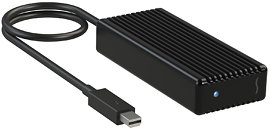Tuesday, April 7th 2015
Sonnet Announces Pocketable, PCI Express SSD with Thunderbolt 2 Connectivity
Sonnet today announced the Fusion PCIe Flash Drive, a rugged, pocket-size solid-state drive (SSD) storage device with 256 GB or 512 GB storage capacity - and the newest member of Sonnet's growing family of Thunderbolt 2 technology products. The Sonnet flash drive serves as an ultra-fast alternative to USB thumb drives and portable SATA-based hard disk drive and SSD storage products, and it connects to a compatible Mac or Windows computer, or at the end of a Thunderbolt device daisy chain, via an attached 0.5-meter Thunderbolt cable.
Sonnet designed the Fusion PCIe Flash Drive around the latest generation M.2 PCIe SSD module, which is the fastest standard SSD type now available, and a 20 Gbps Thunderbolt 2 interface that provides the bandwidth necessary for the device to sustain ultra-high file transfer speeds - fast enough to support 4K workflows. Capable of transferring files at over 1200 MB/s, the Fusion PCIe Flash Drive's SSD module incorporates a PCIe Gen 3 flash controller, enabling the device to significantly outperform 6 Gbps SATA SSDs and USB 3.0 flash drives.Measuring a very compact 1.75 inches wide by 4 inches deep by 0.8 inches tall and small enough to fit in a user's pocket, the Fusion PCIe Flash Drive's rugged enclosure is crafted out of aluminum, which effectively transfers heat from the SSD and allowed Sonnet to design the device without a fan to enable silent operation. The power-efficient design also enabled the device to be bus-powered and require no power adapter.
"The Fusion PCIe Flash Drive leverages the latest advancements in PCIe SSD design and Thunderbolt 2 technology, enabling Sonnet to offer a storage device that fits neatly in the palm of your hand yet delivers the blazing-fast performance of a multi-drive RAID storage system many times its size," said Robert Farnsworth, Sonnet Technologies CEO. "We think this will become an indispensible accessory for the creative professional."
The Fusion PCIe Flash Drive was designed for anybody requiring high-speed storage capabilities, and it is especially well suited to serve as an ultra-fast shuttle drive or a take-anywhere drive for editing 4K video at offsite shoots. OS X users may install the operating system on the Sonnet device to create an extremely fast boot drive, while OS X and Windows users can use the Fusion PCIe Flash Drive for instant-access media storage or as a high-performance scratch disk. The Fusion PCIe Flash Drive was designed and built by Sonnet in California.
Compatible with OS X 10.8.5+ (including Yosemite), Microsoft Windows 8 and 7, and Windows Server 2012 and 2008, the Fusion PCIe Flash Drive will be demonstrated at the 2015 NAB Show in booth SL10824. Sonnet expects to make the new drive available in June 2015 at an MSRP of $499 for 256 GB and $799 for 512 GB.
Sonnet designed the Fusion PCIe Flash Drive around the latest generation M.2 PCIe SSD module, which is the fastest standard SSD type now available, and a 20 Gbps Thunderbolt 2 interface that provides the bandwidth necessary for the device to sustain ultra-high file transfer speeds - fast enough to support 4K workflows. Capable of transferring files at over 1200 MB/s, the Fusion PCIe Flash Drive's SSD module incorporates a PCIe Gen 3 flash controller, enabling the device to significantly outperform 6 Gbps SATA SSDs and USB 3.0 flash drives.Measuring a very compact 1.75 inches wide by 4 inches deep by 0.8 inches tall and small enough to fit in a user's pocket, the Fusion PCIe Flash Drive's rugged enclosure is crafted out of aluminum, which effectively transfers heat from the SSD and allowed Sonnet to design the device without a fan to enable silent operation. The power-efficient design also enabled the device to be bus-powered and require no power adapter.
"The Fusion PCIe Flash Drive leverages the latest advancements in PCIe SSD design and Thunderbolt 2 technology, enabling Sonnet to offer a storage device that fits neatly in the palm of your hand yet delivers the blazing-fast performance of a multi-drive RAID storage system many times its size," said Robert Farnsworth, Sonnet Technologies CEO. "We think this will become an indispensible accessory for the creative professional."
The Fusion PCIe Flash Drive was designed for anybody requiring high-speed storage capabilities, and it is especially well suited to serve as an ultra-fast shuttle drive or a take-anywhere drive for editing 4K video at offsite shoots. OS X users may install the operating system on the Sonnet device to create an extremely fast boot drive, while OS X and Windows users can use the Fusion PCIe Flash Drive for instant-access media storage or as a high-performance scratch disk. The Fusion PCIe Flash Drive was designed and built by Sonnet in California.
Compatible with OS X 10.8.5+ (including Yosemite), Microsoft Windows 8 and 7, and Windows Server 2012 and 2008, the Fusion PCIe Flash Drive will be demonstrated at the 2015 NAB Show in booth SL10824. Sonnet expects to make the new drive available in June 2015 at an MSRP of $499 for 256 GB and $799 for 512 GB.

4 Comments on Sonnet Announces Pocketable, PCI Express SSD with Thunderbolt 2 Connectivity
What i find kinda fasinated is how thunderblot do daisy chain and can have a screen at the end of a daisy chain.
The other problem is native integration of thunderbolt connectivity on MB : www.newegg.com/Product/ProductList.aspx?Submit=ENE&IsNodeId=1&N=100007627 600470698
Newegg only lists one MB... It's not the only merchant in the world but it's a good example.
Seriously, do you think that i don't know that USB 3.1 is not a PCI-E native technology ? And yeah, you can have ten devices on a single chain, but will you use it ?
Be realistic.
I'm an Intel user, but i don't see TB technology that will last unlike USB 3.1